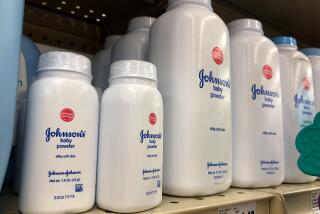Victory for Advil : Tylenol Claims Misled Public, N.Y. Judge Says
It may be a tough pill for the makers of Extra Strength Tylenol to swallow.
But a U.S. District Court judge in New York has ruled that Johnson & Johnson, maker of the popular pain pills, was misleading customers when it said in Tylenol commercials, “You can’t buy a more potent pain reliever without a prescription.”
In fact, the ingredient ibuprofen in rival painkiller Advil sometimes makes it “substantially more effective” than Extra Strength Tylenol, said Judge William C. Conner.
Another series of Extra Strength Tylenol ads that appeared in physicians’ journals were also ruled misleading by the judge.
The ruling came in a lawsuit filed by American Home Products, which makes Advil, Dristan and a wide range of other drugs. It contended that millions of dollars worth of Johnson & Johnson advertising over the past decade was sometimes “false and misleading.”
There’s a “new player “ in the annual $2 billion analgesic market, said Ronald Nordmann, senior drug analyst at Paine Webber Inc. And that player, ibuprofen, “has changed the entire equation,” he said. Advil has been on the market just two years, but in that short time has rocketed to become one of the top sellers.
The over-the-counter painkiller market now consists basically of aspirin, aspirin substitutes like Tylenol and Anacin 3 that are called acetaminophens and the new ibuprofen products like Advil and Nuprin.
The court ruling has given one huge headache to Johnson & Johnson--and to Saatchi & Saatchi Compton Inc., one of the agencies that handles Tylenol advertising. “Our attorneys haven’t studied the ruling yet,” said a spokesman for New Brunswick, N.J.-based Johnson & Johnson. “But nothing in our present advertising is affected by it.”
Although not expected to damage the sales of Extra Strength Tylenol, the ruling “will force Johnson & Johnson to pull back a bit in claims it makes about some products,” said Paine Webber’s Nordmann.
The judge’s decision may, however, have little immediate impact on the current advertising of Extra Strength Tylenol since the company pulled the specific ads in question a year ago.
But American Home Products is still seeking nearly $2 billion in damages, said Charles F. Hagan, vice president and general counsel for the company. He said that his company has spent nearly $2 million on the year-old suit.
In a 65-page opinion handed down Wednesday and made public Friday, Judge Conner said, “Small nations have fought for their very survival with less resources and resourcefulness then these antagonists.”
The battle is far from over. And advertising experts say that the decision could have a profound effect on the way that rival companies handle their ad disputes.
Since 1971, the advertising industry has attempted to regulate itself. Companies have taken their grievances to the National Advertising Review Board--a group of ad executives and business executives who review the arguments and render decisions. Most advertisers have historically adhered to these rulings. On occasion, the Federal Trade Commission has also reviewed such claims. But now, some companies are discovering that the courts may be the best avenue of all.
“You can get a trial on a false advertising case within six months,” said American Home Product’s Hagan. “With the FTC, it can take years.”
Also, going through the courts often generates a lot more publicity, said James M. Carman, a marketing professor at the University of California’s Berkeley Business School. “But the whole problem of ad claims are really not settled well in the courts,” he said. “They’re too messy and complicated for the court system.”
More to Read
Sign up for Essential California
The most important California stories and recommendations in your inbox every morning.
You may occasionally receive promotional content from the Los Angeles Times.










